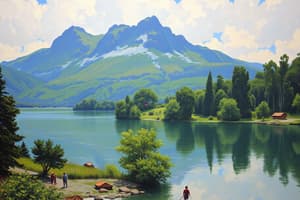Podcast
Questions and Answers
What is one of the roles investigated by physical geographers in relation to water bodies?
What is one of the roles investigated by physical geographers in relation to water bodies?
- Energy production
- Mining exploration
- Carbon sequestration (correct)
- Air pollution control
Which aspect of plant communities do geographers study?
Which aspect of plant communities do geographers study?
- Distributions and adaptations (correct)
- Culinary uses
- Fashion trends
- Political affiliations
What type of natural hazard is studied by physical geographers?
What type of natural hazard is studied by physical geographers?
- Zombie apocalypse
- Earthquakes and floods (correct)
- Robot uprisings
- Alien invasions
What knowledge gained from physical geography is crucial for addressing climate change?
What knowledge gained from physical geography is crucial for addressing climate change?
How do geographers contribute to policymaking according to the text?
How do geographers contribute to policymaking according to the text?
What do physical geographers explore to understand Earth's characteristics and evolution?
What do physical geographers explore to understand Earth's characteristics and evolution?
What does physical geography primarily deal with?
What does physical geography primarily deal with?
Which of the following is NOT a process that shapes landforms according to physical geography?
Which of the following is NOT a process that shapes landforms according to physical geography?
What is climate in the context of physical geography?
What is climate in the context of physical geography?
Why is water important in physical geography?
Why is water important in physical geography?
How do physical geographers use the water cycle in their studies?
How do physical geographers use the water cycle in their studies?
Which factor does NOT influence local climate conditions according to physical geography?
Which factor does NOT influence local climate conditions according to physical geography?
Study Notes
Geography: Physical Geography
Physical geography is a branch of geography that deals with the natural features, phenomena, and processes that shape Earth's surface and atmosphere. It involves understanding the interactions among landforms, climate, soils, vegetation, and ecosystems to better comprehend the distribution of plants and animals around the globe.
Land Formation
Physical geographers study the processes that shape landforms, such as erosion, weathering, deposition, glaciation, volcanism, tectonic activity, and sea-level change. These processes create diverse landscapes like mountains, valleys, coastlines, plains, and plateaus. By studying landforms, geographers understand patterns of relief and elevation that impact human settlement, agriculture, and infrastructure.
Climate
Climate is another major element of physical geography. It refers to long-term patterns of atmospheric conditions, including temperature, precipitation, humidity, wind, and solar radiation. Geographers examine regional climates, microclimates, and global air circulation systems, considering how factors like altitude, latitude, distance from large bodies of water, and nearby landforms influence local climate conditions.
Water Cycle and Hydrology
Water is essential to life on Earth, shaping landscapes and affecting human activities. Physical geographers study the movement, distribution, and properties of water through the water cycle. This includes investigating the roles played by rivers, lakes, oceans, aquifers, wetlands, and other water bodies in shaping environments and supporting life.
Vegetation and Ecosystems
Plants and their relationships with animals, soil, water, and climate are governed by ecological principles that guide physical geography. Geographers study plant communities, their distributions, and adaptations to different environments. They also explore the links between vegetation and ecosystem services, such as carbon sequestration, water purification, and habitat provision.
Natural Hazards and Disasters
Physical geographers delve into the causes, consequences, and mitigation efforts related to various natural hazards and disasters, such as earthquakes, floods, hurricanes, fires, droughts, and mass wasting events. This understanding helps governments, agencies, and individuals prepare for, respond to, and recover from these catastrophic events.
Applications in Science and Policy
Knowledge gained from physical geography is vital for addressing contemporary challenges like climate change, sustainable resource management, urban planning, coastal zone management, disaster risk reduction, and conservation of biodiversity. By applying their insights, geographers inform policymaking, strategic planning, and environmental management decisions at scales ranging from local to global.
In summary, physical geography is a dynamic discipline that explores the complex interactions between Earth's natural elements to understand the characteristics, origins, and evolution of our planet's surface and atmosphere. Its findings have significant implications for human societies and the environment, making it a critical component of modern geography education and practice.
Studying That Suits You
Use AI to generate personalized quizzes and flashcards to suit your learning preferences.
Description
Explore the diverse field of physical geography, which focuses on natural features, phenomena, and processes that shape Earth's surface and atmosphere. Topics include land formation, climate, water cycle, vegetation, ecosystems, natural hazards, and their applications in science and policy.




